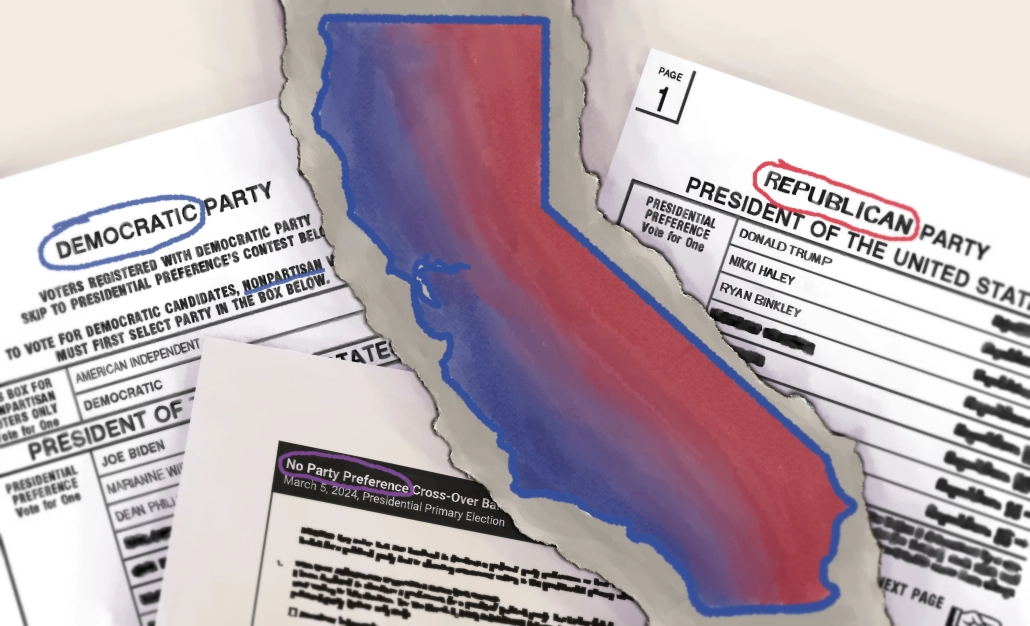PUBLIC DISCLOSURE
Independent in mind, heart and voter registration
For the first time, my March 5 primary ballot will reflect who I really am.
For the first time, my March 5 primary ballot will reflect who I really am.


I slightly disenfranchised myself this Sunday when I registered to vote in the California March primary election. It’s a little anger-inducing for me, but in order to stay true to who I am, I ended up doing something I’d thought of since I became eligible to vote but didn’t have the willpower to do. So, in the spirit of “Public Disclosure,” it’s time for me to open up about my newest political party affiliation for our 2024 election year: none.
I’m a proud independent voter, generally averse to the two-party system. Now, I’ve finally got the California ballot to match — even if it means I have fewer options or offices to vote for.
Most states in the union aren’t kind to us independents during primary season, making many of us, even if we don’t technically consider ourselves members of one of the two parties, resort to affiliating with one anyway so we can vote in its — oftentimes — closed, members-only presidential primaries or feel more included in the political process. You know, kind of like when you didn’t really choose to play tag during recess in elementary school, but you’d suck it up and run around that damn soccer field anyway so you weren’t left out.
And with that uber-childish analogy in hand, I decided that registering with a party that doesn’t reflect the wide range of my beliefs just to vote in their members-only primary was, in short, a stupid-ass disservice to myself. I still think so, even though my disaffiliation is mostly to make a point, and even if this action does nothing to redeem or advocate for the sea of disillusioned American moderates who feel left out by political party messaging year after year, campaign after campaign.
This reckoning is an old one, too; the United States’ own Founding Fathers, funnily enough, argued for and against political parties repeatedly as the young nation saw its first presidential administrations. Alexander Hamilton called political parties “the most fatal disease” of popular governments. James Madison, in “Federalist No. 10,” said, “Liberty is to faction what air is to fire, an aliment without which it instantly expires.” Thomas Jefferson alleged that men will always divide themselves into two distinct parties.
“In every country, these two parties exist, and in every one where they are free to think, speak, and write, they will declare themselves,” Jefferson wrote. “Call them … by whatever name you please; they are the same parties still and pursue the same object.”
But even if the debate will live on for years, we’re at an impasse when it comes to who we allow to vote in our states’ primary elections. We’re not smiling with wooden teeth or fighting off a tyrannical monarchy anymore — our country is over 247 years old now, and political independence is gaining sentience: 52% of Generation Z and a very similar proportion of millennials do not identify with either major political party, according to Gallup. Our two youngest generations of voters have a higher proportion of independents than they have in decades, much more than our parents’ and grandparents’ generations.
Should those millions of voters be left out of choosing presidential primary candidates who reflect their goals for the future simply because they aren’t in that candidate’s party? Should a right-leaning independent in California be boxed out of voting for Nikki Haley (example, not an endorsement) on March 5 unless they formally register as a Republican?
I’ll leave it to you to answer for yourselves, but in the meantime, this is where I want my fellow California independents to listen up: Not only do we have our primary approaching, but, depending on who you’re voting for, you may still be able to vote for a party-affiliated presidential candidate if you jump through a few extra hoops.
If you’ve selected “No Party Affiliation” like me and you’d like to cast a vote for the U.S. president on March 5, your default vote-by-mail ballot for this election will not have any candidates for this office. The workaround? You’re able to request a “cross-over” ballot application to include presidential candidates from one of these three parties: the American Independent Party (different from the ‘independent’ I’ve been yakking about), the Libertarian Party or the Democratic Party.
Simply call, email or submit the application in person to your county’s election office, and you’re on your way to being just as active as the Democrats and Republicans next door, albeit with fewer options. And if you’re wondering if it’s worth it to go through all this just to vote for president at all, I’ll leave you with this: Staying true to yourself, your principles, your beliefs — down to even the smallest act of punching a ballot — is priceless.
We are the only independent newspaper here at USC, run at every level by students. That means we aren’t tied down by any other interests but those of readers like you: the students, faculty, staff and South Central residents that together make up the USC community.
Independence is a double-edged sword: We have a unique lens into the University’s actions and policies, and can hold powerful figures accountable when others cannot. But that also means our budget is severely limited. We’re already spread thin as we compensate the writers, photographers, artists, designers and editors whose incredible work you see in our daily paper; as we work to revamp and expand our digital presence, we now have additional staff making podcasts, videos, webpages, our first ever magazine and social media content, who are at risk of being unable to receive the support they deserve.
We are therefore indebted to readers like you, who, by supporting us, help keep our paper daily (we are the only remaining college paper on the West Coast that prints every single weekday), independent, free and widely accessible.
Please consider supporting us. Even $1 goes a long way in supporting our work; if you are able, you can also support us with monthly, or even annual, donations. Thank you.
This site uses cookies. By continuing to browse the site, you are agreeing to our use of cookies.
Accept settingsDo Not AcceptWe may request cookies to be set on your device. We use cookies to let us know when you visit our websites, how you interact with us, to enrich your user experience, and to customize your relationship with our website.
Click on the different category headings to find out more. You can also change some of your preferences. Note that blocking some types of cookies may impact your experience on our websites and the services we are able to offer.
These cookies are strictly necessary to provide you with services available through our website and to use some of its features.
Because these cookies are strictly necessary to deliver the website, refusing them will have impact how our site functions. You always can block or delete cookies by changing your browser settings and force blocking all cookies on this website. But this will always prompt you to accept/refuse cookies when revisiting our site.
We fully respect if you want to refuse cookies but to avoid asking you again and again kindly allow us to store a cookie for that. You are free to opt out any time or opt in for other cookies to get a better experience. If you refuse cookies we will remove all set cookies in our domain.
We provide you with a list of stored cookies on your computer in our domain so you can check what we stored. Due to security reasons we are not able to show or modify cookies from other domains. You can check these in your browser security settings.
These cookies collect information that is used either in aggregate form to help us understand how our website is being used or how effective our marketing campaigns are, or to help us customize our website and application for you in order to enhance your experience.
If you do not want that we track your visit to our site you can disable tracking in your browser here:
We also use different external services like Google Webfonts, Google Maps, and external Video providers. Since these providers may collect personal data like your IP address we allow you to block them here. Please be aware that this might heavily reduce the functionality and appearance of our site. Changes will take effect once you reload the page.
Google Webfont Settings:
Google Map Settings:
Google reCaptcha Settings:
Vimeo and Youtube video embeds:
The following cookies are also needed - You can choose if you want to allow them:
